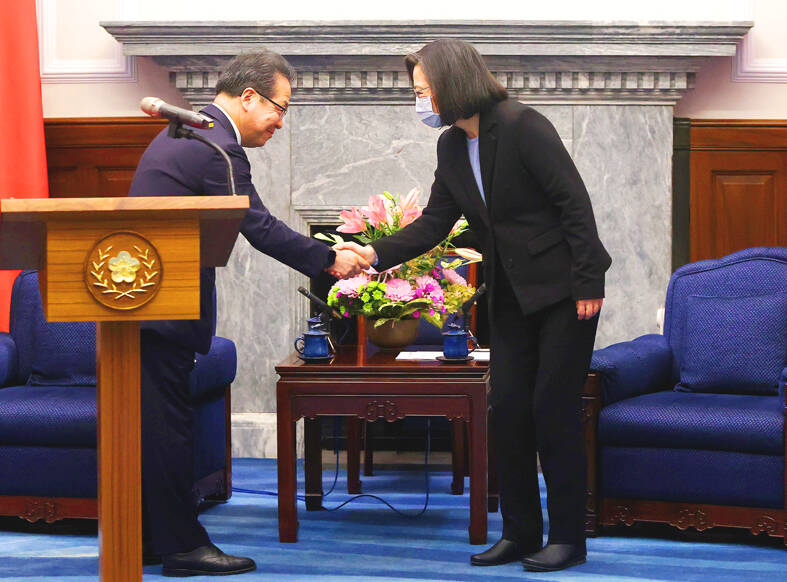Taiwan and Japan should join forces with other democracies to safeguard regional security, President Tsai Ing-wen (蔡英文) yesterday told a visiting Japanese delegation, whose members lauded Taipei’s decision to revamp it military service.
Tsai said that Taiwan seeks to deepen security arrangements and bolster ties with Japan as she met with the delegation at the Presidential Office in Taipei.
The nation would also engage in closer cooperation with democratic countries such as Japan, the US and European nations, to serve the common goals of maintaining peace and security, and to achieve free trade and economic prosperity in the Indo-Pacific region, she said.

Photo: CNA
Taiwan is also seeking to join the Comprehensive and Progressive Agreement for Trans-Pacific Partnership, and asks Japanese lawmakers to support the nation in its bid, Tsai said.
The two sides discussed Japan’s revision of three key national security documents amid increasing threats from China to imply that Tokyo could act on “contingencies” around Taiwan, which lies about 100km from Okinawa Prefecture’s westernmost island.
Tsai said Taiwan welcomes the revision and reiterated that the nation would take responsibility for its self-defense, adding that on Tuesday she announced a move to expand mandatory conscription to one year and that her government would make other changes to the military’s composition.
In the revamped national defense plan, Taiwan is to bolster its reservist system and is considering establishing a civilian militia, while those who have signed up as professional soldiers would form the main body of the armed forces.
Japanese lawmaker Hiroshige Seko, who heads the delegation, through an interpreter lauded the new defense plan.
“We learned of President Tsai’s announcement of the major policy change on Taiwan’s national defense yesterday... Along with restoring mandatory military service to one year, she also presented programs to strengthen the armed forces and enhance Taiwan’s defense capability,” Seko said.
The new plan also includes increased spending for weapons procurement and the purchase of next-generation missile systems, signaling Taiwan’s resolve to take charge of its self-defense.
Seko said that Tsai “made this clear with the new military policy, which I shall give very high praise.”
Japan’s latest national defense paper has made it clear that Tokyo would not tolerate unilateral changes to the “status quo” in the Taiwan Strait, Seko said.
He said Japan recently revised its National Security Strategy, with a pledge to significantly increase defense spending to boost its military capability and preparedness, and to respond to contingencies in the region.
In the strategy document approved on Dec. 16, Japan designated Taiwan as an “extremely important partner,” Seko said, adding that the Japanese government attaches great importance to maintaining peace and stability in the Taiwan Strait.
Separately, the White House in a statement welcomed Taiwan’s pledge to revamp its military, saying that it underscores “Taiwan’s commitment to self-defense and strengthens deterrence.”
A White House spokesperson said the US “will continue to assist Taiwan in maintaining a sufficient self-defense capability in line with our commitments under the Taiwan Relations Act and our one China policy.”
“The United States will continue to support a peaceful resolution of cross-Strait issues, and oppose any unilateral changes in the status quo by either side,” they said.

A magnitude 5.6 earthquake struck off the coast of Yilan County at 12:37pm today, with clear shaking felt across much of northern Taiwan. There were no immediate reports of damage. The epicenter of the quake was 16.9km east-southeast of Yilan County Hall offshore at a depth of 66.8km, Central Weather Administration (CWA) data showed. The maximum intensity registered at a 4 in Yilan County’s Nanao Township (南澳) on Taiwan’s seven-tier scale. Other parts of Yilan, as well as certain areas of Hualien County, Taipei, New Taipei City, Taoyuan, Hsinchu County, Taichung and Miaoli County, recorded intensities of 3. Residents of Yilan County and Taipei received

Taiwan has secured another breakthrough in fruit exports, with jujubes, dragon fruit and lychees approved for shipment to the EU, the Ministry of Agriculture said yesterday. The Animal and Plant Health Inspection Agency on Thursday received formal notification of the approval from the EU, the ministry said, adding that the decision was expected to expand Taiwanese fruit producers’ access to high-end European markets. Taiwan exported 126 tonnes of lychees last year, valued at US$1.48 million, with Japan accounting for 102 tonnes. Other export destinations included New Zealand, Hong Kong, the US and Australia, ministry data showed. Jujube exports totaled 103 tonnes, valued at

TRUST: The KMT said it respected the US’ timing and considerations, and hoped it would continue to honor its commitments to helping Taiwan bolster its defenses and deterrence US President Donald Trump is delaying a multibillion-dollar arms sale to Taiwan to ensure his visit to Beijing is successful, a New York Times report said. The weapons sales package has stalled in the US Department of State, the report said, citing US officials it did not identify. The White House has told agencies not to push forward ahead of Trump’s meeting with Chinese President Xi Jinping (習近平), it said. The two last month held a phone call to discuss trade and geopolitical flashpoints ahead of the summit. Xi raised the Taiwan issue and urged the US to handle arms sales to

BIG SPENDERS: Foreign investors bought the most Taiwan equities since 2005, signaling confidence that an AI boom would continue to benefit chipmakers Taiwan Semiconductor Manufacturing Co’s (TSMC, 台積電) market capitalization swelled to US$2 trillion for the first time following a 4.25 percent rally in its American depositary receipts (ADR) overnight, putting the world’s biggest contract chipmaker sixth on the list of the world’s biggest companies by market capitalization, just behind Amazon.com Inc. The site CompaniesMarketcap.com ranked TSMC ahead of Saudi Aramco and Meta Platforms Inc. The Taiwanese company’s ADRs on Tuesday surged to US$385.75 on the New York Stock Exchange, as strong demand for artificial intelligence (AI) applications led to chip supply constraints and boost revenue growth to record-breaking levels. Each TSMC ADR represents